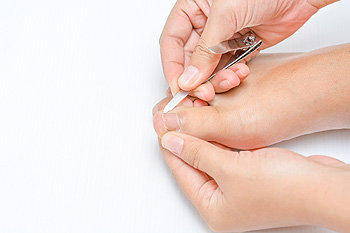 Ingrown toenails are uncomfortable and can sometimes make it painful to walk. Common causes for this condition include ill-fitting shoes, injury, excessively sweaty feet, and thick or curved nails. Once they have started to form, ingrown toenails can go through three stages. Stage 1 begins with the initial inflammation and is followed by moderate pain, swelling, redness, and visible fluid accumulation. Stage 2 occurs if the symptoms begin to worsen. Signs that the nail is entering stage 2 are increased pain and pus discharge from the wound. Stage 3 is the most severe form of an ingrown toenail and requires medical attention in order to be treated. In stage 3, new tissue can form over the wound, which can easily intensify the infection. It’s important to begin treating an ingrown toenail as soon as you notice any symptoms, so you can avoid progression into stage 3. If you have an ingrown toenail, it is recommended you consult with a podiatrist to learn about treatment options.
Ingrown toenails are uncomfortable and can sometimes make it painful to walk. Common causes for this condition include ill-fitting shoes, injury, excessively sweaty feet, and thick or curved nails. Once they have started to form, ingrown toenails can go through three stages. Stage 1 begins with the initial inflammation and is followed by moderate pain, swelling, redness, and visible fluid accumulation. Stage 2 occurs if the symptoms begin to worsen. Signs that the nail is entering stage 2 are increased pain and pus discharge from the wound. Stage 3 is the most severe form of an ingrown toenail and requires medical attention in order to be treated. In stage 3, new tissue can form over the wound, which can easily intensify the infection. It’s important to begin treating an ingrown toenail as soon as you notice any symptoms, so you can avoid progression into stage 3. If you have an ingrown toenail, it is recommended you consult with a podiatrist to learn about treatment options.
Ingrown toenails can become painful if they are not treated properly. For more information about ingrown toenails, contact Dr. Michael E. Newman of Pennsylvania. Our doctors can provide the care you need to keep you pain-free and on your feet.
Ingrown Toenails
Ingrown toenails occur when a toenail grows sideways into the bed of the nail, causing pain, swelling, and possibly infection.
Causes
- Bacterial infections
- Improper nail cutting such as cutting it too short or not straight across
- Trauma to the toe, such as stubbing, which causes the nail to grow back irregularly
- Ill-fitting shoes that bunch the toes too close together
- Genetic predisposition
Prevention
Because ingrown toenails are not something found outside of shoe-wearing cultures, going barefoot as often as possible will decrease the likeliness of developing ingrown toenails. Wearing proper fitting shoes and using proper cutting techniques will also help decrease your risk of developing ingrown toenails.
Treatment
Ingrown toenails are a very treatable foot condition. In minor cases, soaking the affected area in salt or antibacterial soaps will not only help with the ingrown nail itself, but also help prevent any infections from occurring. In more severe cases, surgery is an option. In either case, speaking to your podiatrist about this condition will help you get a better understanding of specific treatment options that are right for you.
If you have any questions please feel free to contact one of our offices located in Plymouth Meeting and Ambler, PA. We offer the newest diagnostic and treatment technologies for all your foot and ankle needs.
Read more about Ingrown Toenails